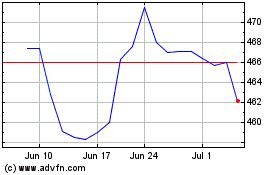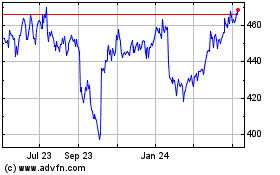Aerojet's Pursuit of Rocket Venture Fails to Lift Off -- Update
September 16 2015 - 6:36PM
Dow Jones News
By Andy Pasztor
Aerojet Rocketdyne Holdings Inc.'s $2 billion offer for the
Pentagon's premier rocket-making venture collapsed Wednesday, with
Boeing Co. announcing it wasn't interested in selling its stake and
never took the bid seriously.
Starting in August, rocket-engine maker Aerojet Rocketdyne had
quietly pursued United Launch, a 50-50 joint venture between Boeing
and Lockheed Martin Corp., which the U.S. military and spy agencies
currently rely on to launch nearly all of their satellites.
After word of the unsolicited bid leaked out last week-- roiling
the global satellite-launch market and raising a multitude of
questions among Pentagon brass--Lockheed Martin was leaning toward
divesting its stake, according to people familiar with the
discussions.
But on Wednesday, in a stinging rejection of Aerojet's move,
senior Boeing space and defense officials took the unusual step of
publicly saying they didn't even consider the offer worthy of
detailed negotiations or analysis.
It was "not something we seriously entertained," according to
Boeing spokesman Todd Blecher. On the sidelines of an
industry-government conference in suburban Washington, D.C., on
Wednesday, Chris Chadwick, head of Boeing's sprawling defense
operations, reiterated to reporters that Boeing didn't give the bid
any serious consideration, wasn't looking for other offers and was
committed to the joint venture. Boeing and Lockheed Martin together
invested an estimated $4 billion to develop the families of Atlas V
and Delta IV rockets that formed the backbone of the joint venture
created with the Pentagon's blessing roughly a decade ago.
Lockheed Martin has declined to comment on the matter, but
industry officials previously said members of its executive suite
were leaning toward selling assets of the joint venture as part of
a broader, companywide portfolio reshaping. When the partners
formally rejected the bid earlier this week, however, both
delivered the same unequivocal message and rejected further
discussions, according to one person familiar with the details.
Aerojet Rocketdyne's first statement after days of intense,
behind-the-scenes maneuvering and discussions with Air Force
officials shed little light on what happened. A spokesman said the
company "routinely evaluates" possible acquisitions but "won't
comment on potential business combinations until such a point [as]
there is a definitive agreement in place."
Before the rejection, Aerojet Rocketdyne representatives weren't
offered access to the joint venture's books as part of typical due
diligence, according to several people familiar with the
details.
For Boeing and Lockheed Martin, which have balked at making
long-term commitments to develop a new generation of rockets for
the venture, major financial challenges remain. Amid the Pentagon's
shrinking satellite-launch business and escalating competition from
lower-cost rocket providers, the partners confront decisions about
further cuts to the venture's overhead.
The number of launchpads used by the venture is being reduced,
and industrial partners are being asked to shoulder more investment
in next-generation hardware. Against this backdrop, the venture's
management is scrambling to adjust personnel levels and institute
procedural changes to speed up assembly of rocket stages before
liftoff.
More important, United Launch's fate over the next decade relies
on a risky strategy: sharply increasing its share of commercial and
nonmilitary government launches.
Doug Cameron contributed to this article.
Write to Doug Cameron at doug.cameron@wsj.com
Subscribe to WSJ: http://online.wsj.com?mod=djnwires
(END) Dow Jones Newswires
September 16, 2015 18:21 ET (22:21 GMT)
Copyright (c) 2015 Dow Jones & Company, Inc.
Lockheed Martin (NYSE:LMT)
Historical Stock Chart
From Mar 2024 to Apr 2024

Lockheed Martin (NYSE:LMT)
Historical Stock Chart
From Apr 2023 to Apr 2024
